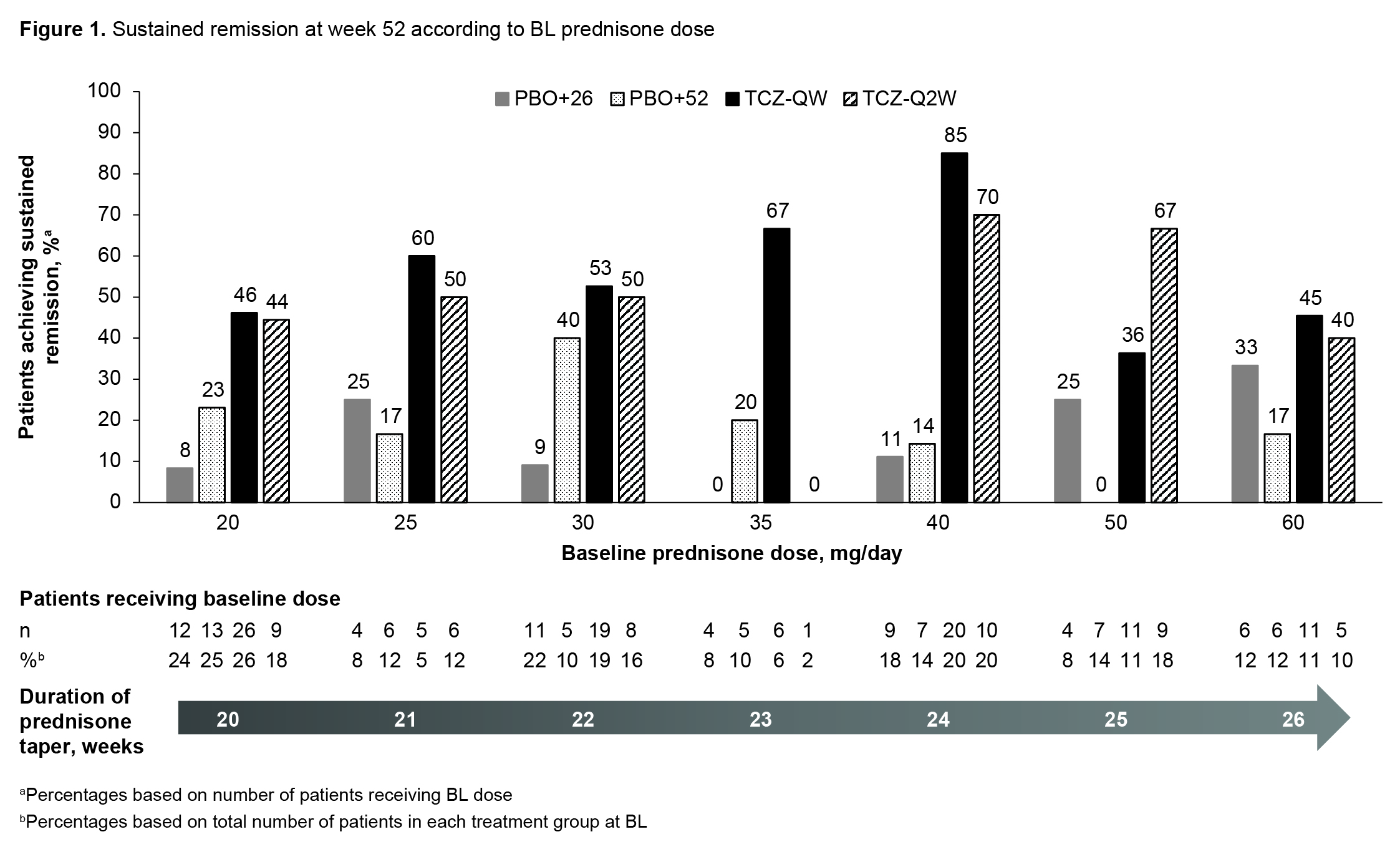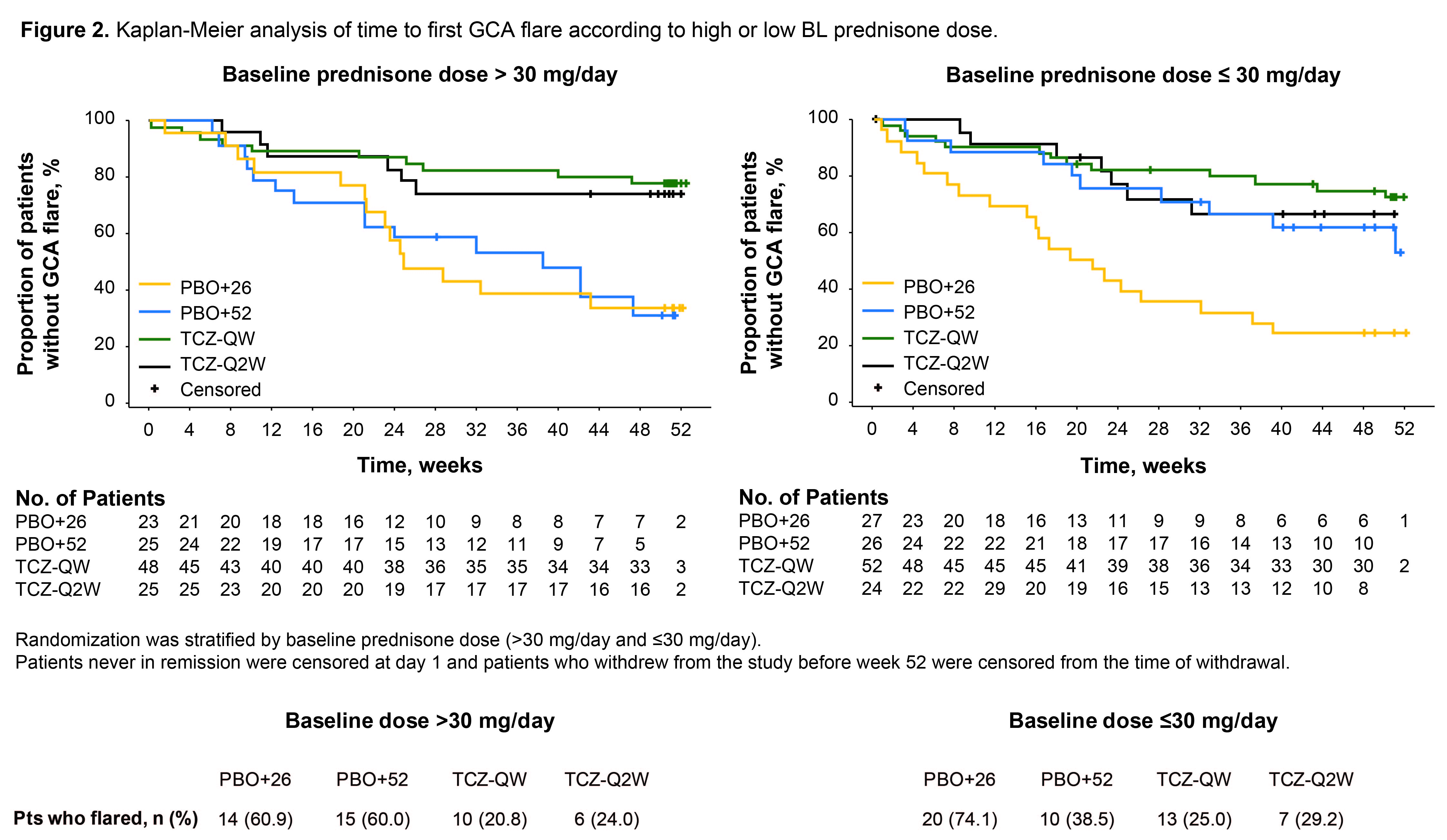Session Information
Date: Tuesday, October 23, 2018
Title: Vasculitis Poster III: Immunosuppressive Therapy in Giant Cell Arteritis and Polymyalgia Rheumatica
Session Type: ACR Poster Session C
Session Time: 9:00AM-11:00AM
Background/Purpose: Adding tocilizumab (TCZ) to tapered prednisone treatment for patients (pts) with giant cell arteritis (GCA) leads to improved rates of sustained glucocorticoid-free remission.1 It is not known, however, whether the glucocorticoid dose at initiation of TCZ affects disease control. We investigated sustained remission and disease flare according to baseline (BL) prednisone doses in pts with GCA treated with TCZ or placebo (PBO) and scheduled prednisone tapering in the GiACTA trial.1
Methods: Pts received TCZ-weekly or -every-other-week + 26-week prednisone taper (TCZ-QW [n=100] or TCZ-Q2W [n=49]) or placebo + 26-week or 52-week prednisone taper (PBO+26 [n=50] or PBO+52 [n=51]) for 52 weeks.1 Flare was defined as recurrence of GCA signs/symptoms and/or ESR ≥30 mm/h attributable to GCA requiring increased prednisone dose. Sustained remission was defined as absence of flare, normalization of CRP (<1 mg/dL), and adherence to the protocol-defined prednisone taper to week 52. All pts received prednisone during screening at a dose selected by the investigator before entry to the trial at BL. In this post hoc analysis, sustained remission rates were assessed according to BL prednisone dose and time to first flare was assessed according to protocol-defined BL prednisone dose stratification factors (>30 mg/day or ≤30 mg/day). All analyses are descriptive.
Results: Sustained remission was achieved by higher proportions of pts in the TCZ groups than the PBO groups across the range of BL prednisone doses (Figure 1). Figure 2 shows Kaplan-Meier analysis of time to flare. Among pts with high BL prednisone doses (>30 mg/day), TCZ-treated pts had longer time to flare than pts in the PBO groups. Pts with low BL prednisone doses (≤30 mg/day) had separation between the TCZ groups and the PBO+26 group from week 12, with longer time to flare in the TCZ and PBO+52 groups than in the PBO+26 group. In the PBO+26 group, pts with low BL prednisone doses flared earlier than pts with high BL doses, but there was no apparent difference in time to flare between high and low BL prednisone dose for the TCZ groups.
Conclusion: Pts with GCA treated with TCZ and prednisone tapering could achieve sustained remission across a range of BL prednisone doses. Fewer pts in the TCZ groups than the PBO groups had GCA flares. Time to flare was similar for pts treated with TCZ regardless of starting prednisone dose. Reference: 1. Stone JH et al. N Engl J Med. 2017;377: 317-328. Acknowledgment: GiACTA investigators. Medical writing: Sara Duggan, PhD, funded by F. Hoffmann La-Roche Ltd.
To cite this abstract in AMA style:
Stone JH, Tuckwell K, Dimonaco S, Klearman M, Aringer M, Blockmans D, Brouwer E, Cid MC, Dasgupta B, Rech J, Salvarani C, Schulze-Koops H, Schett G, Spiera RF, Unizony SH, Collinson N. Effects of Baseline Prednisone Dose on Remission and Disease Flare in Patients with Giant Cell Arteritis Treated with Tocilizumab in a Phase 3 Randomized Controlled Trial [abstract]. Arthritis Rheumatol. 2018; 70 (suppl 9). https://acrabstracts.org/abstract/effects-of-baseline-prednisone-dose-on-remission-and-disease-flare-in-patients-with-giant-cell-arteritis-treated-with-tocilizumab-in-a-phase-3-randomized-controlled-trial/. Accessed .« Back to 2018 ACR/ARHP Annual Meeting
ACR Meeting Abstracts - https://acrabstracts.org/abstract/effects-of-baseline-prednisone-dose-on-remission-and-disease-flare-in-patients-with-giant-cell-arteritis-treated-with-tocilizumab-in-a-phase-3-randomized-controlled-trial/


